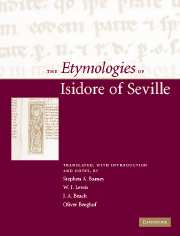Book contents
- Frontmatter
- Contents
- Acknowledgements
- Note to the Reader
- INTRODUCTION
- THE ETYMOLOGIES
- Analytical table of contents
- Book I Grammar (De grammatica)
- Book II Rhetoric and dialectic (De rhetorica et dialectica)
- Book III Mathematics (De mathematica)
- Book IV Medicine (De medicina)
- Book V Laws and times (De legibus et temporibus)
- Book VI Books and ecclesiastical offices (De libris et officiis ecclesiasticis)
- Book VII God, angels, and saints (De deo, angelis et sanctis)
- Book VIII The church and sects (De ecclesia et sectis)
- Book IX Languages, nations, reigns, the military, citizens, family relationships (De linguis, gentibus, regnis, militia, civibus, affinitatibus)
- Book X Vocabulary (De vocabulis)
- Book XI The human being and portents (De homine et portentis)
- Book XII Animals (De animalibus)
- Book XIII The cosmos and its parts (De mundo et partibus)
- Book XIV The earth and its parts (De terra et partibus)
- Book XV Buildings and fields (De aedificiis et agris)
- Book XVI Stones and metals (De lapidibus et metallis)
- Book XVII Rural matters (De rebus rusticis)
- Book XVIII War and games (De bello et ludis)
- Book XIX Ships, buildings, and clothing (De navibus aedificiis et vestibus)
- Book XX (Provisions and various implements)
- APPENDIX Correspondence of Isidore and Braulio
- INDEX
Book XVII - Rural matters (De rebus rusticis)
Published online by Cambridge University Press: 22 September 2009
- Frontmatter
- Contents
- Acknowledgements
- Note to the Reader
- INTRODUCTION
- THE ETYMOLOGIES
- Analytical table of contents
- Book I Grammar (De grammatica)
- Book II Rhetoric and dialectic (De rhetorica et dialectica)
- Book III Mathematics (De mathematica)
- Book IV Medicine (De medicina)
- Book V Laws and times (De legibus et temporibus)
- Book VI Books and ecclesiastical offices (De libris et officiis ecclesiasticis)
- Book VII God, angels, and saints (De deo, angelis et sanctis)
- Book VIII The church and sects (De ecclesia et sectis)
- Book IX Languages, nations, reigns, the military, citizens, family relationships (De linguis, gentibus, regnis, militia, civibus, affinitatibus)
- Book X Vocabulary (De vocabulis)
- Book XI The human being and portents (De homine et portentis)
- Book XII Animals (De animalibus)
- Book XIII The cosmos and its parts (De mundo et partibus)
- Book XIV The earth and its parts (De terra et partibus)
- Book XV Buildings and fields (De aedificiis et agris)
- Book XVI Stones and metals (De lapidibus et metallis)
- Book XVII Rural matters (De rebus rusticis)
- Book XVIII War and games (De bello et ludis)
- Book XIX Ships, buildings, and clothing (De navibus aedificiis et vestibus)
- Book XX (Provisions and various implements)
- APPENDIX Correspondence of Isidore and Braulio
- INDEX
Summary
i. Authors on rural matters (De auctoribus rerum rusticarum) 1. Among the Greeks, Hesiod of Boeotia was the first to make skill in writing on rural matters a part of a liberal education; then Democritus. Mago of Carthage also wrote a study of agriculture in twenty-eight volumes. Among the Romans Cato was first to treat of agriculture, then Marcus Terence (i.e. Varro) refined its study, and then Vergil exalted it with the commendation of his poems. No lesser inquiry was made later by Cornelius Celsus, Julius Atticus, Aemilianus (i.e. Palladius), and the distinguished orator Columella who embraced the whole corpus of that discipline.
2. They say that the first person who yoked oxen to the plow was a certain private citizen, who had been struck by lightning, named Homogirus – but some say Osiris was the inventor of this craft, and some say Triptolemus. Here the question is in what manner Ceres in Greece first established the turning of the soil with iron – with whatever kind of iron implement, not specifically with the plowshare or plow. 3. A certain man named Stercutus first brought the technique of dunging (stercorare) fields to Italy, and his altar in Rome was dedicated by Picus. He invented many agricultural tools, and was the first to enrich fields. Some have thought that this man was Saturn, in order to do him greater honor by that name under which he would sound magnificent and would procure dignity from the title.
- Type
- Chapter
- Information
- The Etymologies of Isidore of Seville , pp. 337 - 358Publisher: Cambridge University PressPrint publication year: 2006

